人教版(2019)选择性必修第二册Unit 3 Food and Culture Reading and thinking 课件(共20张PPT)
文档属性
| 名称 | 人教版(2019)选择性必修第二册Unit 3 Food and Culture Reading and thinking 课件(共20张PPT) | 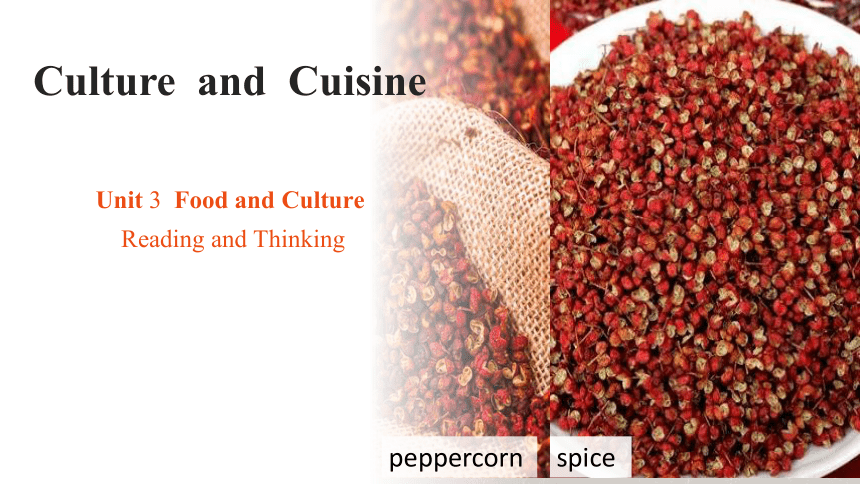 | |
| 格式 | pptx | ||
| 文件大小 | 8.2MB | ||
| 资源类型 | 教案 | ||
| 版本资源 | 人教版(2019) | ||
| 科目 | 英语 | ||
| 更新时间 | 2024-04-14 12:27:37 | ||
图片预览

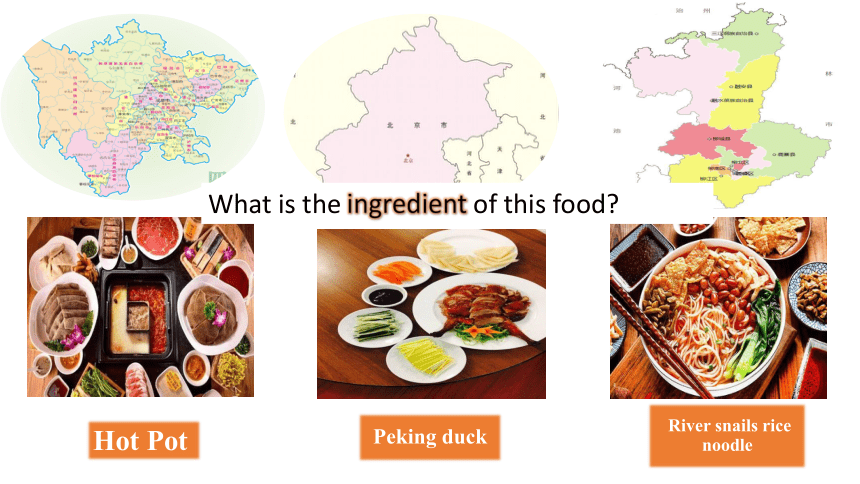
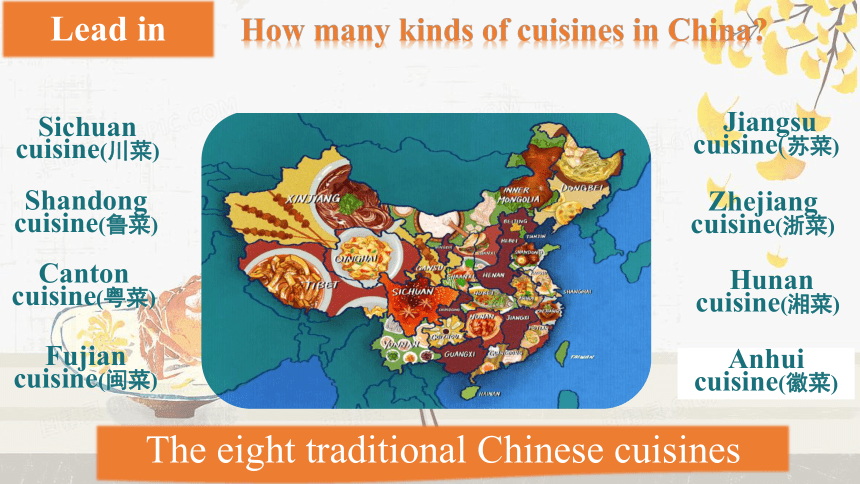
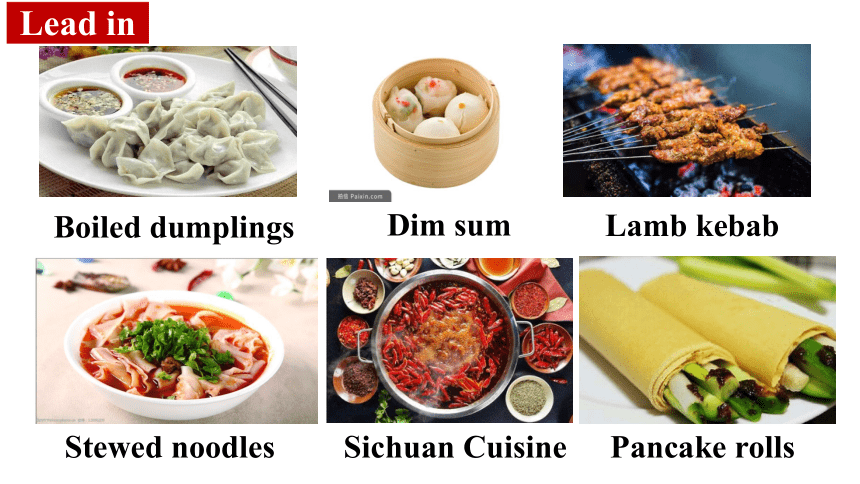
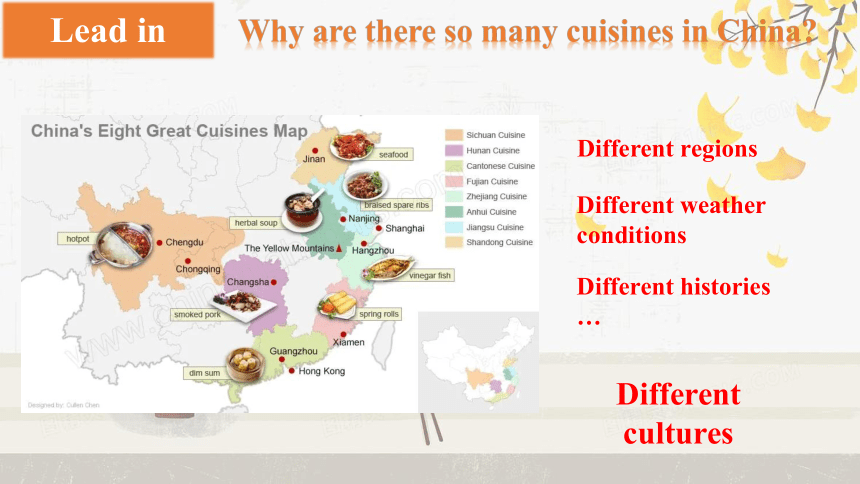
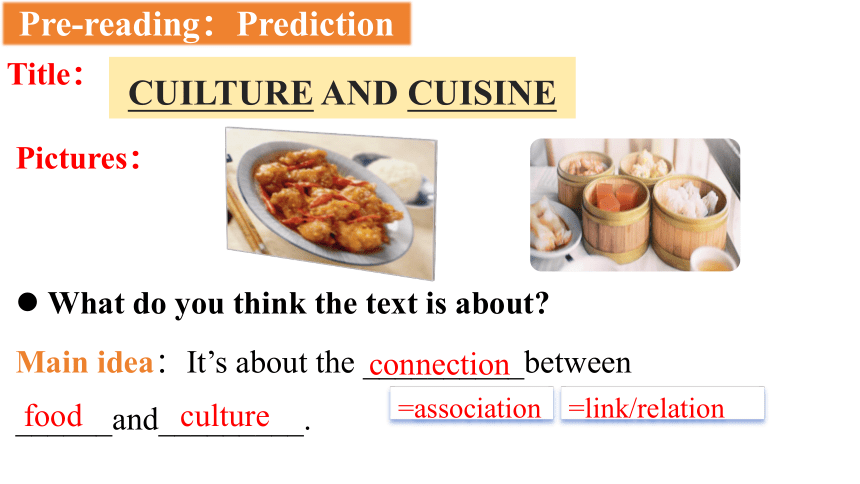
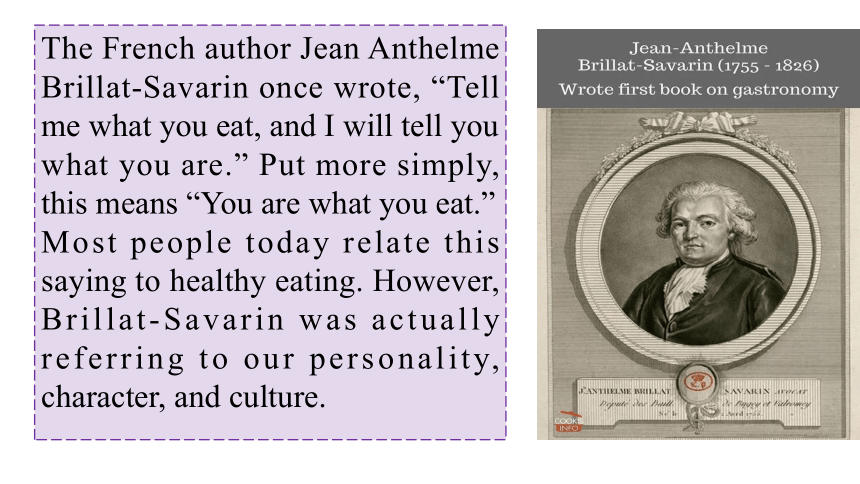
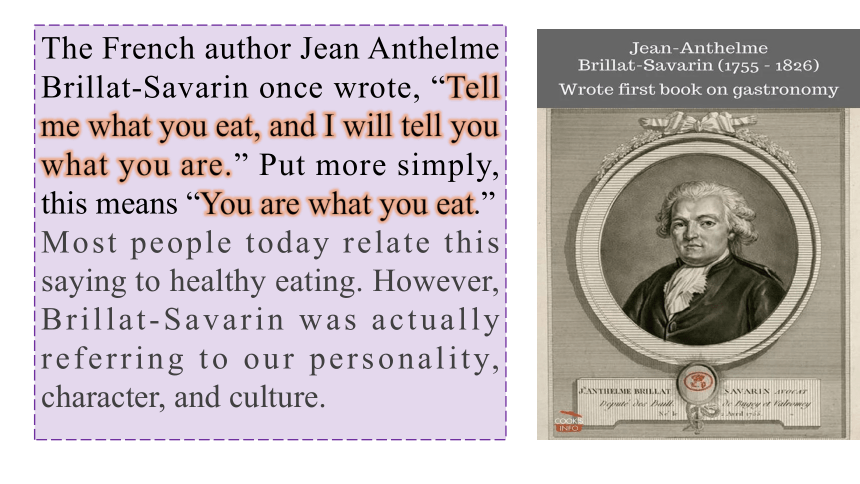
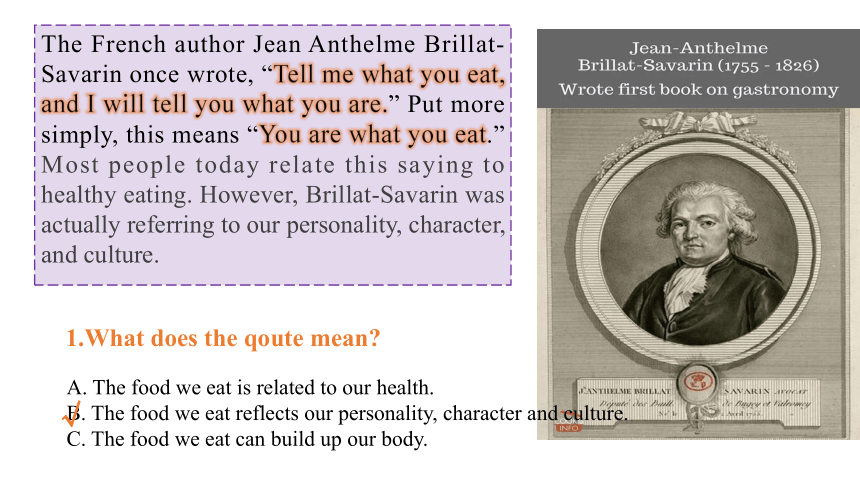
文档简介
(共20张PPT)
Culture and Cuisine
Unit 3 Food and Culture
Reading and Thinking
spice
peppercorn
Hot Pot
Peking duck
River snails rice noodle
What is the ingredient of this food
How many kinds of cuisines in China
Anhui cuisine(徽菜)
Jiangsu cuisine(苏菜)
Zhejiang cuisine(浙菜)
Hunan cuisine(湘菜)
Lead in
Sichuan cuisine(川菜)
Shandong cuisine(鲁菜)
Canton cuisine(粤菜)
Fujian cuisine(闽菜)
The eight traditional Chinese cuisines
Pancake rolls
Sichuan Cuisine
Stewed noodles
Lamb kebab
Dim sum
Boiled dumplings
Lead in
Why are there so many cuisines in China
Different regions
Different weather conditions
Different cultures
Different histories
…
Lead in
CUILTURE AND CUISINE
What do you think the text is about
Pictures:
Title:
Main idea:It’s about the __________between ______and_________.
connection
Pre-reading:Prediction
food
culture
=association
=link/relation
The French author Jean Anthelme Brillat-Savarin once wrote, “Tell me what you eat, and I will tell you what you are.” Put more simply, this means “You are what you eat.” Most people today relate this saying to healthy eating. However, Brillat-Savarin was actually referring to our personality, character, and culture.
The French author Jean Anthelme Brillat-Savarin once wrote, “Tell me what you eat, and I will tell you what you are.” Put more simply, this means “You are what you eat.” Most people today relate this saying to healthy eating. However, Brillat-Savarin was actually referring to our personality, character, and culture.
The French author Jean Anthelme Brillat-Savarin once wrote, “Tell me what you eat, and I will tell you what you are.” Put more simply, this means “You are what you eat.” Most people today relate this saying to healthy eating. However, Brillat-Savarin was actually referring to our personality, character, and culture.
1.What does the qoute mean
A. The food we eat is related to our health.
B. The food we eat reflects our personality, character and culture.
C. The food we eat can build up our body.
√
The French author Jean Anthelme Brillat-Savarin once wrote, “Tell me what you eat, and I will tell you what you are.” Put more simply, this means “You are what you eat.” Most people today relate this saying to healthy eating. However, Brillat-Savarin was actually referring to our personality, character, and culture.
1.What does the qoute mean
A. The food we eat is related to our health.
B. The food we eat reflects our personality, character and culture.
C. The food we eat can build up our body.
√
The French author Jean Anthelme Brillat-Savarin once wrote, “Tell me what you eat, and I will tell you what you are.” Put more simply, this means “You are what you eat.” Most people today relate this saying to healthy eating. However, Brillat-Savarin was actually referring to our personality, character, and culture.
A. To introduce a topic.
B. To give an evidence.
C. To set an example.
2. What is the writer’s purpose of using the quote in first paragraph
√
Main idea: You are what you eat.
The French author Jean Anthelme Brillat-Savarin once wrote, “Tell me what you eat, and I will tell you what you are.” Put more simply, this means “You are what you eat.” Most people today relate this saying to healthy eating. However, Brillat-Savarin was actually referring to our personality, character, and culture.
Certainly, in many ways this seems to be true. Chinese cuisine is a case in point.
The French author Jean Anthelme Brillat-Savarin once wrote, “Tell me what you eat, and I will tell you what you are.” Put more simply, this means “You are what you eat.” Most people today relate this saying to healthy eating. However, Brillat-Savarin was actually referring to our personality, character, and culture.
Certainly, in many ways this seems to be true. Chinese cuisine is a case in point.
Certainly, in many ways this seems to be true. Chinese cuisine is a case in point.
The French author Jean Anthelme Brillat-Savarin once wrote, “Tell me what you eat, and I will tell you what you are.” Put more simply, this means “You are what you eat.” Most people today relate this saying to healthy eating. However, Brillat-Savarin was actually referring to our personality, character, and culture.
In the following paragraphs, what might be discussed to clarify/prove the author’s opinion
= a good example
different food
What kind of food do they eat
connections
What’s the connection between people and food
different regions/ places
How many places are mentioned
place kind of Chinese food Food experienced (during the tour) Culture revealed
by the food
America
Beijing
Shandong
Northern Xinjiang
South China (Guangdong)
Central China (Henan)
change to suit America tastes
wonderful and different
traditional
boiled or roasted meat
elegant
exceptional
General Tso’s chicken, which consists of fried chicken covered in a sweet sauce, flavoured with hot red peppers.
Dishes flavoured with Sichuan peppercorns
Boiled dumplings served with vinegar
pancake rolls stuffed with sliced Chinese green onions
Lamb kebab
Dim sum(small servings of food in bamboo steamers)
Stewed noodles
Americans love bold, simple flavours,not to try new foods
People are friendly
Family is important
-a family affair with everyone- from youngest to the oldest-joining to help.
Those groups triditionally
wandered the open range on horses
cook food over an open fire
People are friendly and kind
Everywhere, the food was as varied as the people.
Can you share one typical food in your city
Group discussion
Tell us how the dish is made, and what cultural facts about the city we can learn from the dish.
Chongqing
stuffed
flavoured with
sliced
boiled
roasted
stewed
steamed
fried
covered in
Personality
Character
Culture
...
Most people today relate this saying to healthy eating. However, Brillat-Savarin was actually referring to our personality, character, and culture.
At a minimum, the kinds of food local people consume tell us what they grow in their region, what kinds of lives the lead, and what they like and do not like.
Personality
Character
Culture
Agriculture
Lifestyle
Preference
...
What we can say, however, is that culture and cuisine go hand in hand, and if you do not experience one, you can never really know the other.
Assighment for the next period
Do you agree with the author
Share your ideas with us based on what you have learned and your personal experience
Culture and Cuisine
Unit 3 Food and Culture
Reading and Thinking
spice
peppercorn
Hot Pot
Peking duck
River snails rice noodle
What is the ingredient of this food
How many kinds of cuisines in China
Anhui cuisine(徽菜)
Jiangsu cuisine(苏菜)
Zhejiang cuisine(浙菜)
Hunan cuisine(湘菜)
Lead in
Sichuan cuisine(川菜)
Shandong cuisine(鲁菜)
Canton cuisine(粤菜)
Fujian cuisine(闽菜)
The eight traditional Chinese cuisines
Pancake rolls
Sichuan Cuisine
Stewed noodles
Lamb kebab
Dim sum
Boiled dumplings
Lead in
Why are there so many cuisines in China
Different regions
Different weather conditions
Different cultures
Different histories
…
Lead in
CUILTURE AND CUISINE
What do you think the text is about
Pictures:
Title:
Main idea:It’s about the __________between ______and_________.
connection
Pre-reading:Prediction
food
culture
=association
=link/relation
The French author Jean Anthelme Brillat-Savarin once wrote, “Tell me what you eat, and I will tell you what you are.” Put more simply, this means “You are what you eat.” Most people today relate this saying to healthy eating. However, Brillat-Savarin was actually referring to our personality, character, and culture.
The French author Jean Anthelme Brillat-Savarin once wrote, “Tell me what you eat, and I will tell you what you are.” Put more simply, this means “You are what you eat.” Most people today relate this saying to healthy eating. However, Brillat-Savarin was actually referring to our personality, character, and culture.
The French author Jean Anthelme Brillat-Savarin once wrote, “Tell me what you eat, and I will tell you what you are.” Put more simply, this means “You are what you eat.” Most people today relate this saying to healthy eating. However, Brillat-Savarin was actually referring to our personality, character, and culture.
1.What does the qoute mean
A. The food we eat is related to our health.
B. The food we eat reflects our personality, character and culture.
C. The food we eat can build up our body.
√
The French author Jean Anthelme Brillat-Savarin once wrote, “Tell me what you eat, and I will tell you what you are.” Put more simply, this means “You are what you eat.” Most people today relate this saying to healthy eating. However, Brillat-Savarin was actually referring to our personality, character, and culture.
1.What does the qoute mean
A. The food we eat is related to our health.
B. The food we eat reflects our personality, character and culture.
C. The food we eat can build up our body.
√
The French author Jean Anthelme Brillat-Savarin once wrote, “Tell me what you eat, and I will tell you what you are.” Put more simply, this means “You are what you eat.” Most people today relate this saying to healthy eating. However, Brillat-Savarin was actually referring to our personality, character, and culture.
A. To introduce a topic.
B. To give an evidence.
C. To set an example.
2. What is the writer’s purpose of using the quote in first paragraph
√
Main idea: You are what you eat.
The French author Jean Anthelme Brillat-Savarin once wrote, “Tell me what you eat, and I will tell you what you are.” Put more simply, this means “You are what you eat.” Most people today relate this saying to healthy eating. However, Brillat-Savarin was actually referring to our personality, character, and culture.
Certainly, in many ways this seems to be true. Chinese cuisine is a case in point.
The French author Jean Anthelme Brillat-Savarin once wrote, “Tell me what you eat, and I will tell you what you are.” Put more simply, this means “You are what you eat.” Most people today relate this saying to healthy eating. However, Brillat-Savarin was actually referring to our personality, character, and culture.
Certainly, in many ways this seems to be true. Chinese cuisine is a case in point.
Certainly, in many ways this seems to be true. Chinese cuisine is a case in point.
The French author Jean Anthelme Brillat-Savarin once wrote, “Tell me what you eat, and I will tell you what you are.” Put more simply, this means “You are what you eat.” Most people today relate this saying to healthy eating. However, Brillat-Savarin was actually referring to our personality, character, and culture.
In the following paragraphs, what might be discussed to clarify/prove the author’s opinion
= a good example
different food
What kind of food do they eat
connections
What’s the connection between people and food
different regions/ places
How many places are mentioned
place kind of Chinese food Food experienced (during the tour) Culture revealed
by the food
America
Beijing
Shandong
Northern Xinjiang
South China (Guangdong)
Central China (Henan)
change to suit America tastes
wonderful and different
traditional
boiled or roasted meat
elegant
exceptional
General Tso’s chicken, which consists of fried chicken covered in a sweet sauce, flavoured with hot red peppers.
Dishes flavoured with Sichuan peppercorns
Boiled dumplings served with vinegar
pancake rolls stuffed with sliced Chinese green onions
Lamb kebab
Dim sum(small servings of food in bamboo steamers)
Stewed noodles
Americans love bold, simple flavours,not to try new foods
People are friendly
Family is important
-a family affair with everyone- from youngest to the oldest-joining to help.
Those groups triditionally
wandered the open range on horses
cook food over an open fire
People are friendly and kind
Everywhere, the food was as varied as the people.
Can you share one typical food in your city
Group discussion
Tell us how the dish is made, and what cultural facts about the city we can learn from the dish.
Chongqing
stuffed
flavoured with
sliced
boiled
roasted
stewed
steamed
fried
covered in
Personality
Character
Culture
...
Most people today relate this saying to healthy eating. However, Brillat-Savarin was actually referring to our personality, character, and culture.
At a minimum, the kinds of food local people consume tell us what they grow in their region, what kinds of lives the lead, and what they like and do not like.
Personality
Character
Culture
Agriculture
Lifestyle
Preference
...
What we can say, however, is that culture and cuisine go hand in hand, and if you do not experience one, you can never really know the other.
Assighment for the next period
Do you agree with the author
Share your ideas with us based on what you have learned and your personal experience
